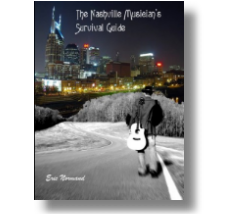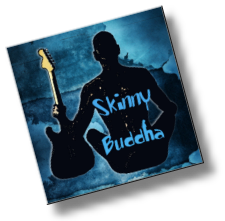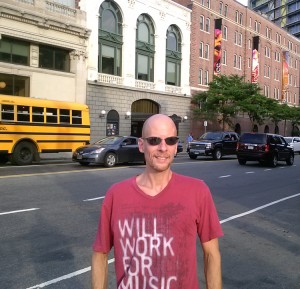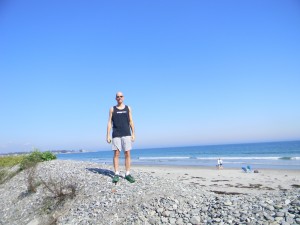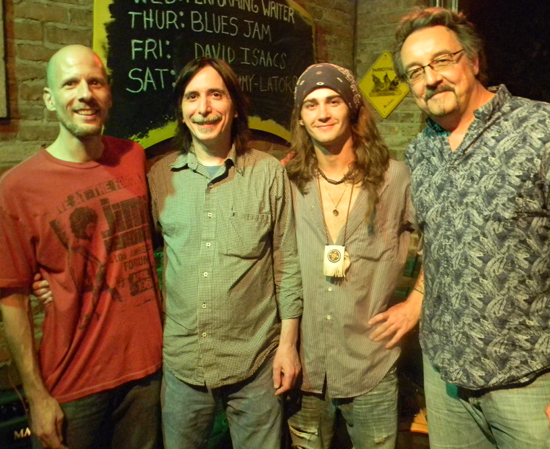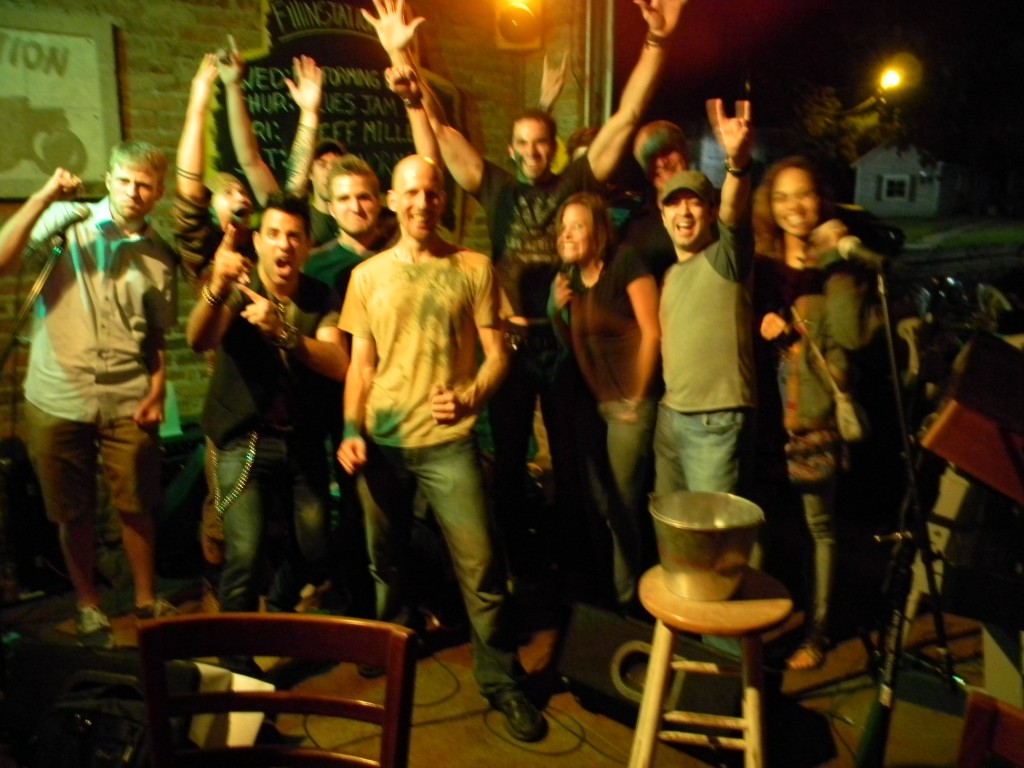
I can’t believe summer is drawing to a close! Well, not really…It’ll still be really hot down here in middle Tennessee for at least another month or so. But to me, especially being from the north, Labor Day weekend always feels like the end of summer – kids go back to school, it begins to get colder, the holidays start creeping up, and so on. And it has been a great summer, at least for me. I worked hard, played some cool shows, hosted a couple of Berklee alumni events, took my first yoga class, released a CD of originals with my band “Skinny Buddha” and had an action-packed 10 day trip to New England, during which I gave a clinic and performance at the Berklee College of Music. And most importantly, I celebrated another anniversary with my wife and best friend of 18 years (I think this is the beginning of a beautiful friendship…).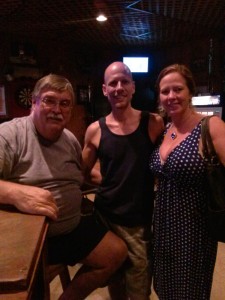
So what’s in store for the fall, you might ask? I’ve got lots going on – I just had the transmission rebuilt in my van, began a new round of P90X, started an herb garden on my back deck, plan to have a yard sale this coming weekend…seriously, I do have a lot of big things in the works.
Skinny Buddha will be the guest artist on “The Mando Blues Radio Show”, with the taping coming up on Monday, November 16, and aired on Wednesday, September 18 on 107.1 FM Radio Free Nashville. Thanks to Whit Hubner from Nashville’s very own “Hippie Radio” we will be rocking the “Mando Blues Tent” with a six song performance. If you haven’t yet discovered it, Hippie Radio is the coolest radio station in Nashville, and you can get a free phone app from their website and listen to them anywhere. Pretty groovy stuff!
Coming up in October, I’ll be playing guitar with “The Peach Pickers” featuring Rhett Akins and Dallas Davidson on the sold out “Luke Bryan Farm Tour”. We did this last year and it was a hoot! This year’s band will consist of Nick Forchione on drums, “G-men” Mike Chapman on bass and Chris Luzinger on guitar, and yours truly on guitar and harmony vocals (for those of you who don’t know, the G-men are an infamous group of Nashville session players who played on all of the Garth Brooks records). Look for us when we come to a farm near you!
On Monday, October 28 I’ll be hosting the last Nashville Berklee Jam of 2013 at The Rutledge with special guest speaker, performance coach, Diane Kimbrough. Diane has coached a wide array of artists ranging from beginners to artists like Shania Twain and Toby Keith. After her talk, she will be critiquing and coaching some of the regular performers from our bimonthly jam. This event is open to the public and should be a great night!
Starting in November, I will be playing some shows with a northern Alabama-based band “The Flashbacks”. Along with Mike Chapman and some other veteran players, I will be digging into a night of 60s and 70s R&B and Motown.
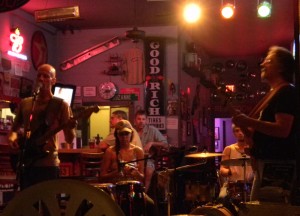 On Wednesday, November 27 Skinny Buddha will be performing a set of Jimi Hendrix music at Nashville’s “Soulshine Pizza” for their special “Jimi Hendrix Tribute Night ” being held on the great guitarist’s birthday. This night will begin with our performance at 9 PM and will conclude with a second show of Hendrix music performed by the legendary, Phil Brown (formerly of Little Feat). This is a great excuse to learn some new Hendrix tunes (well, new to me) and I’m planning on digging into some deep cuts like “Who Knows”, “Hear My Train a Comin’”, “Drivin’ South” and “Stone Free”, in addition to my regular repertoire of Jimi favorites. For any of you that know me, this is an extra special night; one I am honored to be a part of. I first heard Jimi Hendrix at the age of 11, when the sounds of his Woodstock performance of the Star-Spangled Banner sent me on a musical adventure that I am happy to be still exploring.
On Wednesday, November 27 Skinny Buddha will be performing a set of Jimi Hendrix music at Nashville’s “Soulshine Pizza” for their special “Jimi Hendrix Tribute Night ” being held on the great guitarist’s birthday. This night will begin with our performance at 9 PM and will conclude with a second show of Hendrix music performed by the legendary, Phil Brown (formerly of Little Feat). This is a great excuse to learn some new Hendrix tunes (well, new to me) and I’m planning on digging into some deep cuts like “Who Knows”, “Hear My Train a Comin’”, “Drivin’ South” and “Stone Free”, in addition to my regular repertoire of Jimi favorites. For any of you that know me, this is an extra special night; one I am honored to be a part of. I first heard Jimi Hendrix at the age of 11, when the sounds of his Woodstock performance of the Star-Spangled Banner sent me on a musical adventure that I am happy to be still exploring.
And lastly, I am planning to record some more Skinny Buddha music.
That’s about it for now. I hope you all had a great summer and that the fall will bring you much peace and happiness. I guess I’d better go clean out my garage to get ready for the big yard sale!
It’s the first week of this brand-new year of 2013 and, not that I believe in New Year’s resolutions, one of the things I’m going to try to do differently in this new year is to get back to blogging more regularly. In that spirit, I also want to learn how to write shorter blogs. Let’s see how I do at my first attempt.
2012 was an interesting year, a lot happened in our world. A long-winded, and divisive election season came and went, it was one of the most extreme years of extreme weather since record-keeping began; our military is still in the midst of several conflicts around the globe; the tragic Sandy Hook shooting in Connecticut terrified us all, gun control is now a national conversation, and Facebook is still here after a disastrous stock market ploy.
I also had a few big moments. I played a handful of shows with The Peach Pickers (Rhett Akins and Dallas Davidson) on the sold-out Luke Bryan Farm Tour (you can read more about that adventure here), I hosted a monthly Berklee Alumni Jam, got to play music with Jack Pearson (read “Jack Pearson at the Nashville Berklee Jam) and Reese Wynans (read “Stevie Ray Vaughan keyboardist, Reese Wynans talks at Nashville Berklee Jam”), I ran in my first-ever 5K road race, met a lot of cool people, listened to a lot of great records, and cooked and ate a lot of good food!
I’m not sure what lies ahead in 2013, I’ve got a lot of big ideas and plans – we’ll see what happens. One thing that’s on my 2013 to-do list is to get out on the town little more often. After 23 years of being a professional musician I found that it’s still easy to get myself off the couch for a gig, but much harder to just go out and hang. I’m going to try to change that. I plan to still host the Berklee Alumni Jam (we are now going to be doing it quarterly). Thanks to my wife, Kelly, I’ve learned to enjoy running, and we are both training for our first half marathon in April. I’m trying to reassert myself into my musical craft, to take another step, and therefore practicing the guitar and vocals daily and learning new material is a top priority. Basically, I’m trying to stay healthy, inspired, and viable, while trying to help a few folks along the way.
So that’s about it for now. Let me know what you’ve got going on and don’t be afraid to drop me a line. I hope this New Year brings much happiness and success to you and your family. Thanks for reading!
By Eric Normand
What an amazing run of shows we had with Rhett Akins and Dallas Davidson on the forth installment of the Luke Bryan Farm Tour! The sold out tour embarked on eight shows across the Deep South, with Rhett and Dallas performing acoustically on the first four, and me and the boys joining in for full band performances on the second leg. The weather for these events was picture perfect, the crowds were huge, and the shows an amazing encapsulation of kinetic energy!
Me and the rest of the band (Nick Forchione on drums and Tom Good on bass) converged at a bus yard in Nashville on Tuesday night and hopped on Luke’s band bus. You never know what to expect in these situations, (as the two bands began this run as total strangers) and we were pleased to learn that Luke’s band and crew are some of the nicest people you could ever hope to work with. Gracious hosts, they made us feel instantly at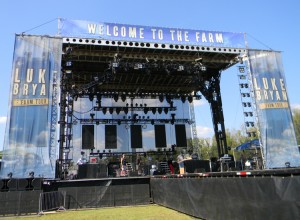 home.
home.
After a good night of sleep on a smooth riding Prevost I awoke in Villa Rica, Georgia. This first show was on a football field, and by the time I wandered over to catering around 10 AM the mobile stage was already up, the field buzzing with activity. Luke went all out on the production for this tour, and there were no less than eight buses accompanying the five semi’s full of staging, audio, lighting, video, and pyro it took to put on these mega-shows.
I was thrilled to find out that there were some other health-conscious folks in Luke’s entourage, and me and Nick joined several of Luke’s band-mates on a trip to the fitness facilities at the University of West Georgia. By 4 PM the stage crew was ready for our sound check, quickly dialing in our in-ear monitor mixes and a bigger than life sound through the mains of the million-dollar Claire Brothers sound system. As a guitar player, I’ve always struggled with in-ear mixes, lack of warmth and ambience being my main gripes, but on this lucky day I learned a new trick. Upon the suggestion of the Claire Brothers monitor engineer, we put a little reverb on my guitar in my ear mix, and this created some extra depth.
Later that night and after the first two openers, Chancie Neal, and Cole Swindell, we took the stage for the first full-band show with Rhett and Dallas. As members of the red-hot songwriting team known as “The Peach Pickers”, Rhett and Dallas have 13 number one songs and countless top 20 hits between them, including a few of Luke’s recent hits “Rain Is a Good Thing”, “Country Girl Shake It for Me”, and “I Don’t Want This Night to 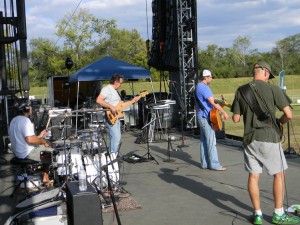 End”. This fact makes it pretty easy to create a blockbuster 45 minute set which included Blake Shelton’s “All about Tonight“ and “Honeybee”, Rodney Atkins’ “Farmer’s Daughter” and “Take a Back Road”, and the Trace Adkins chart topper “Honky Tonk Badonkadonk”, among others. At times the crowd was singing along at a volume that was as loud, if not louder than the band! The action-packed set went by at warp speed, and it seemed like no sooner than we had started we were walking off the stage.
End”. This fact makes it pretty easy to create a blockbuster 45 minute set which included Blake Shelton’s “All about Tonight“ and “Honeybee”, Rodney Atkins’ “Farmer’s Daughter” and “Take a Back Road”, and the Trace Adkins chart topper “Honky Tonk Badonkadonk”, among others. At times the crowd was singing along at a volume that was as loud, if not louder than the band! The action-packed set went by at warp speed, and it seemed like no sooner than we had started we were walking off the stage.
The stagehands helped us get our gear off the stage and by 9 PM our workday was done. A short workday is characteristic for an opening act on a major tour – you’re the last to sound check and the first to play. Now it was Miller time, or in this case “Coors time”, or for a few of us “Crown Royal time”! After a quick cocktail and a little chill time on the bus we went out to check out Luke’s show. The level of musicianship in Luke’s band is nothing short of exceptional, and their 90 minute set was a rocking good time with some stunning visual aspects as this night was a dress rehearsal for the following show which was being taped for a television special.
The following day I awoke and looked out the bus window to the view of an open, grassy field in Athens Georgia – this concert was actually taking place on a real farm! After a little morning chow I decided to take a jog down some of the surrounding roads of this picturesque farming community, Rhett’s song, “Take a Back Road” having some real relevance on this warm autumn day. The day evolved similarly to the previous and the ultra-professional crew did an outstanding job erecting this mega-production in less than ideal circumstances. I later learned that the 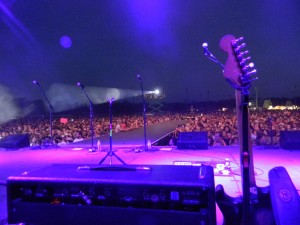 stagehands on this particular tour traveled from show to show (unlike many touring situations where stagehands are local to each venue) and this creates a continuity that helps the production run smoothly. The performances on this night went off without a hitch, with all of the bands delivering outstanding performances. Luke’s show was filled with special visual effects for the filming of the television production – including a laser show, pyro, and a massive finale of fireworks to end the night.
stagehands on this particular tour traveled from show to show (unlike many touring situations where stagehands are local to each venue) and this creates a continuity that helps the production run smoothly. The performances on this night went off without a hitch, with all of the bands delivering outstanding performances. Luke’s show was filled with special visual effects for the filming of the television production – including a laser show, pyro, and a massive finale of fireworks to end the night.
The next day would find us in Tallahassee, Florida and I joined up with some of the guys to go work out at the fitness facilities of Florida State University. After a great workout at a great facility we were ready to get back for some lunch, but not before winding up in a “runner altercation”. The runner informed us that he needed to stop at Lowe’s to get some stage pins for the production crew. Of course they didn’t have what he was looking for and sent us to another store that didn’t have it either. An hour and a half later we caught a lucky break at a John Deere tractor store and were finally heading back to the venue with the necessary part, and some growling stomachs. Another sold out show, another night of great performances and we were off to the tour’s grand finale in Macon, Georgia.
As Luke’s buses were returning to Nashville after this final show and we were going on to play one more show with Dallas and Rhett at the Georgia Throwdown in Dallas’ hometown of Albany, Georgia (a festival that Dallas helped organize), we had another bus arriving in Macon late morning. After the bus arrived we loaded our stuff onto it and continued about our day. As Macon is home of the final resting place of Duane Allman and Berry Oakley, a couple of us took the mile and a half walk to the Rose Hill Cemetery, a place from another world where a young Allman Brothers Band once played guitars, wrote songs, and partied into the hot Georgia nights.
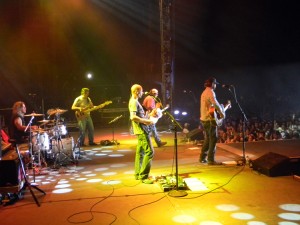 Later on we took the stage in front of 16,000 fans for a final, climactic performance on this epic tour. I’ve played countless big shows over my decade in Nashville, but on this particular night a special energy was present. The songs just seemed to play themselves and the crowd was singing every chorus (and many verses) at a near deafening volume. At one point I pulled out one of my in-ear monitors to really internalize the feeling of the moment. As a musician it’s almost otherworldly to hear and feel your guitar coming out of 100,000 watts or so of PA speakers, and to feel the interaction between artists, band and audience on a show at this level is truly amazing! Our band was really on and Rhett and Dallas were at the top of their game, putting on a dazzling show for what looked like a sea of humanity that stretched to the horizon.
Later on we took the stage in front of 16,000 fans for a final, climactic performance on this epic tour. I’ve played countless big shows over my decade in Nashville, but on this particular night a special energy was present. The songs just seemed to play themselves and the crowd was singing every chorus (and many verses) at a near deafening volume. At one point I pulled out one of my in-ear monitors to really internalize the feeling of the moment. As a musician it’s almost otherworldly to hear and feel your guitar coming out of 100,000 watts or so of PA speakers, and to feel the interaction between artists, band and audience on a show at this level is truly amazing! Our band was really on and Rhett and Dallas were at the top of their game, putting on a dazzling show for what looked like a sea of humanity that stretched to the horizon.
A little while later Luke and his boys played their final show of the Farm Tour, and their epic performances received over-the-top responses after each song. When the show ended all of the artists, musicians, and crew members gathered on the stage for a group photo of the entire entourage. I was sad to see this run end, but we left for Albany with the knowledge that we made a lot of people happy over the course of this week, and we had also made some great new friends! See you next year, Farm Tour!
To view a slideshow of some pics from the tour click here.
Guitarist, singer, songwriter, producer and session-musician, Jack Pearson shared some unique perspective about his musical journey with a room full of Berklee alumni and others from the Nashville music community last Tuesday. The Nashville Berklee Jam, held monthly at the Fillin’ Station in Kingston Springs, saw some new faces and old friends on this special night, and Jack’s decades of experience as a world-class musician provided a rare peek behind the curtain for all those in attendance.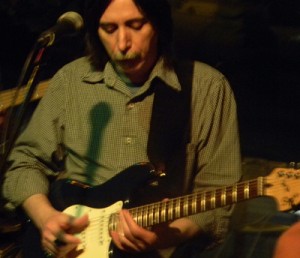
Jack’s musical career began in the mid 1970’s, when he played in multiple bands and logged his first recording session at age 16. In 1993 the Nashville native began his relationship with The Allman Brothers Band as a sub for Dickey Betts, eventually becoming a member of the ABB from 1997-1999 and also touring with Gregg Allman & Friends. Over the years he’s also worked with Vince Gill, Delbert McClinton, Jimmy Buffett, Earl Scruggs, Bobby “Blue” Bland, Amy Grant, Faith Hill, Gov’t Mule, Buddy DeFranco, and countless others.
Jack began his part of this night by playing some beautiful sketches of “I Can’t Get Started”, and for those who have never heard him play, his ability to transport an audience through time and space with nothing other than an unaccompanied electric guitar became quickly apparent. Following the spontaneous applause, Jack cut straight to some Q & A. One of the first questions asked was about his guitar, and I found it interesting that the deep, rich tone coming out of our backline Fender Deluxe originated from a Fender “Squire” Stratocaster, which he had recently bought for $100 at a pawn shop. Plugged into nothing other than a lone tube screamer, this drove home the point that great tone comes from within.
Learning from his oldest brother, Jack was exposed to rockabilly and blues as a teenager and explored the music of Chuck Berry, The Ventures, and Carl Perkins at a young age before eventually discovering jazz greats like, Wes Montgomery, Django Reinhardt, and Charlie Christian. Learning from friends, other musicians, and records, he slowly pieced together his musical vocabulary. He shared some thoughts on how to approach a II-V turnaround, demonstrating some different voicings and melodic approaches, underscoring the importance of putting song and melody above the technical understanding of modes and scales.
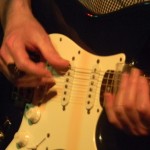 “It takes a lot of experimenting… a lot of guys come to me that get out of school and they say, “when I hear this chord I’m supposed to play this mode and scale”, and it locks them up. They can’t make any melodies because they’re told to play a mode or a scale.”
“It takes a lot of experimenting… a lot of guys come to me that get out of school and they say, “when I hear this chord I’m supposed to play this mode and scale”, and it locks them up. They can’t make any melodies because they’re told to play a mode or a scale.”
This simple, but prophetic thought resonated, and I had flashes to a time in my life when I over analyzed the music I played. Jack drove this point home with “…it comes down to the chord and the melody and where it’s going to…”
He went on to talk about the blending of styles and how he went through different periods of his life where he would be deeply immersed in a singular style for a few years – Delta blues, jazz, etc., and that after a while, all these different styles started coming together. Not afraid to take some chances musically, he demonstrated how he might go from a Howlin’ Wolf lick to a Charlie Parker lick within the same phrase, and that while some players will say this is wrong, he believes that “the main thing is to get the music out, and play with feeling.”
In response to a question about some of his best and worst gigs, Jack said that some of the worst gigs are when people don’t listen, and the music that you play with somebody is more important than the venue, or how famous somebody is.
He explained how learning all of the Allman Brothers songs as a kid helped put him in the position to sub for Dickey Betts on an early 90s Allman Brothers tour, which led to some recording with Gregg Allman and eventually to a phone call from Greg in which he was asked if he wanted to join the Allman Brothers band.
He candidly shared how this landmark gig damaged his hearing, causing an already existing case of Tinnitus to worsen, ultimately forcing him to leave the gig, perhaps sooner than he otherwise would have.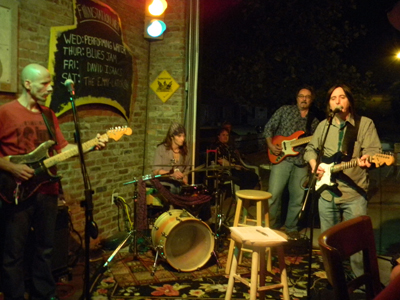
“There’s really no way to describe how loud it was on stage…Dickey Betts wasn’t in the PA…he was 135 dB side stage…”
As a fellow tinnitus sufferer I completely related to this portion of his talk and gained some new perspective as he explained that, despite wearing earplugs, extreme SPL’s (sound pressure levels) can still do damage, as the sound can affect your inner ear by entering your nose, mouth, and through your bones.
In response to a question about life lessons learned through music he answered, “Try not to take music for granted, it’s so special, and you can reach so many people…lyrics can encourage you, relate to your pain, but you can also do it with notes.” He demonstrated this by showing how the same group of notes can sound happy, or sad depending on where the emphasis is placed. He talked about the endless possibilities of how you can play even a single note, demonstrating this concept by playing a huge range of variances on a high “G” note.
After Jack’s talk concluded he played a short set with our Alumni House Band, the air becoming filled with the sounds of spontaneous applause after each inspired performance. Jack left shortly after his set, and the other alums in attendance continued jamming into the night. I, and everyone else in attendance would like to extend our appreciation and gratitude to Jack for sharing his music and journey on this special night!
Our next Nashville Berklee Jam will feature country music artist and hit-songwriter, Rhett Akins on Tuesday, September 11 at The Fillin’ Station. For more info, go to www.nashvilleberkleejam.com.
Even though the majority of the people who come to Nashville for CMA week are country music fans, you didn’t have to be one to enjoy the BMI songwriter showcase-tailgate party yesterday at LP Field. This unique event was as much a foot stompin’ rock concert as it was country music show, and the crowd of 3000 plus concertgoers received a rare treat on this warm, sunny afternoon. 2011 EMI songwriter of the year, Rhett Akins, and 2011 BMI songwriter of the year, Dallas Davidson, also known as the Peach Pickers, have written some of the biggest chart-toppers in recent country music history, and collectively have more hits songs currently on the radio than any of the major artists they write for.
As professional songwriters, they sit in a room with their acoustic guitars daily, writing hundreds of songs a year to come up with a handful of radio-bound gems. These songwriting sessions, and the demo recording process that follows, are quite often the first and last times they get to perform this music. So this rare occasion to play the hits they wrote in front of a large audience was as much, if not even more of a treat to the Peach Pickers as it was to anybody in attendance.
The hour-long show was off and running with the number one hit cut by Blake Shelton, “All About Tonight”, a fitting start for this musical adventure. Rhett and Dallas took turns singing verses and choruses as we moved through what was essentially a “greatest hits” of modern country radio music, including the six number ones they’ve written in recent years. The crowd sang along throughout the show as we put our own twist on songs like Honeybee, Take a Back Road, Gimme That Girl, Put a Girl in It, Honky-Tonk Badonkadonk, This Ole’ Boy, and several others.
Near the end of the show, Rhett unexpectedly pulled out a couple of surprises, performing his own hits “That Ain’t My Truck”, and the showstopper, “Kiss My Country Ass”. At a few different points throughout the show, Rhett gave credit to the band which was comprised of Nick Forchione on drums, Mike Chapman on bass, Scott Tweten on guitar, and me on guitar and harmony vocals, the excited crowd responding with cheers of approval every time. We concluded this blockbuster set with the fitting “I Don’t Want This Night to End” a number one song which was cut by Luke Bryan and had just won video of the year the night before.
The truth is that none of us wanted this night to end, it was a special moment and the unique nature of this show will make it one of the more memorable things I have been a part of in my 10+ years working in the Nashville music industry. But the good news is that we will be taking this show on the road a little later on in the summer, performing at Michael Waddell’s annual Bone Collector fan club party on August 17 in Montgomery, Alabama. I want to send out a special thank you to all the fans that came out for this show, and everybody who put in a lot of hard work behind the scenes to make this event the huge success it was. Till next time, “it’s all about tonight”!
Click here to view some photos from the show (courtesy Kelly Normand)
For more in-depth perspective on the behind the scenes of the Nashville music industry, please check out my book “The Nashville Musician’s Survival Guide”, which features an in-depth interview with Rhett as well as many others Nashville insiders.
The latest Nashville Berklee Jam last Tuesday was a great success, thanks to all who attended! The weather was beautiful, so we had a very laid back talk outside on the patio at The Fillin’ Station, our usual location for this event. Rich Redmond, the guest speaker on this night, has worn a lot of hats during his 15 years in Nashville – session/touring drummer, producer, clinician, public speaker, and his hour-long talk gave all in attendance some great perspective into different ways to navigate the Nashville music industry.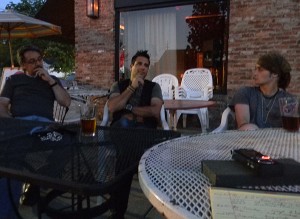
Rich spoke of the need to aggressively market yourself to find work in Nashville and how in his earliest days he obtained work by handing out demo cds of his drumming abilities to almost everyone he would meet around town. He candidly talked about those ‘lean years’, and that long before he was recording on hit records, touring the world with Jason Aldean, and producing acts like ‘Thompson Square’, he was hustling gigs on Broadway, playing in corporate party bands – whatever was necessary to insure survival.
For those who are just starting out in Nashville, he recommended that musicians “take every gig that’s offered”, as every new gig can potentially lead to new relationships and different career opportunities and that “If you give more to people then they expect, if you consistently exceed expectations, people are going to want to work with you.”
He spoke of the need to be ultra-professional by “always returning phone calls in a timely manner, always returning e-mails in a timely manner, being professional, being flexible, having the right gear to do the job and never mailing in a performance…”
Regarding the importance of reputation he said “You can have a great website, you can Tweet 1000 times a day, you can have a fantastic business card that’s got the really good paper, you know the really firm stuff that you have to pay extra for, and it’s still going to come down to word-of-mouth. In this [digital] age it’s so easy to be talked about in a positive or negative way, globally.”
During one part of the talk he mentioned a concept he refers to as “CRASH” a phrase he coined that stands for Commitment, Relationships, Attitude, Skill and Hunger – the five key ingredients he believes are necessary to succeed. He also spoke of the importance of defining your own success, a concept I talk about in my book “The Nashville Musician’s Survival Guide” (coincidentally, Rich contributed to the writing of this book).
After fielding several questions, he finished his talk and we all headed inside to make some music. Everyone who wanted to jam got a chance to sit in, and several great performances took place – ranging from classic rock covers to blues jams to originals. Rich stayed till the end making himself accessible to anyone who wanted to hang and chat, and during the middle of the jam he got behind the drum kit and played a few songs with me and several other alums. Here’s an MP3 of us playing a spirited version of the Jimi Hendrix classic, ‘Little Wing’ Little Wing Berklee Jam w Rich Redmond low. The night ended and we all headed home, but not until gathering for a group photo.
I want to thank everybody who came out and participated to make this another great event, see you at the next one! The next Nashville Berklee Jam will be held on Tuesday, July 10 – check back in a few days for info on the guest speaker for that night.
Some of my earliest childhood memories are of my dad playing records and, dare I say, reel to reel tapes of the music of Paul Butterfield, John Lee Hooker, Santana, and Derek and the Dominoes. I guess this music made an impression, because by my early teens in the early 1980’s I was buying my own records, not of the pop-based FM radio music of my generation, but of the previous generations more blues-based artists. While everyone else was listening to E.L.O. and Michael Jackson, I was discovering Jimi Hendrix, the Allman Brothers, BB King and Bobby Bland. Sure, I liked some of the 80’s guitar rock of the day, but always kept digging back to a more rootsy sound. Then right smack in the middle of 80’s hair band mania came Stevie Ray Vaughan, and I immediately related to his music.
Stevie’s music influenced a generation of guitarists and, at a moment where rock and pop music was winding itself up, almost single-handedly brought blues music back into the light. You couldn’t go see a club band during the late 80’s and early 90’s without hearing his music. I found myself covering his renditions of blues classics like “The Sky Is Cryin’”, “Empty Arms”, as well as originals like “Cold Shot” and “Walkin’ the Tightrope”, as did many others at that time. Stevie’s instrumental “Riviera Paradise” from the album ‘In Step’ is a beautiful piece of American roots music, and I always loved the spooky vibe created by his magical band on that song in particular.
I’ll never forget the day I heard of his tragic passing, how sad it was that we had to lose such a wonderful artist at such a young age. But his music, and the influence of his music, lives on, and I, like many others, will always appreciate everything Stevie did for music, and everything his music has done for the world.
So that’s why when I began hosting the Nashville Berklee Jam I felt compelled to 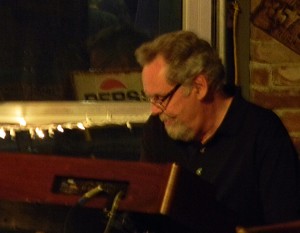 have Reese Wynans, the keyboardist who played with Stevie for the last five years of the great guitarist’s life, as a special guest speaker/performer. Reese was kind enough to share his story with me and a room full of alums at our monthly Nashville Berklee Jam last Tuesday at The Fillin’ Station.
have Reese Wynans, the keyboardist who played with Stevie for the last five years of the great guitarist’s life, as a special guest speaker/performer. Reese was kind enough to share his story with me and a room full of alums at our monthly Nashville Berklee Jam last Tuesday at The Fillin’ Station.
Almost 20 years before he began working with SRV he was playing in cover bands in his home state of Florida, and he recounted one of his first bands playing five sets a night, six nights a week. Two of the other members were Dickey Betts and Berry Oakley and on their one day off they would play a weekly free jam, adding Duane Allman and Butch Trucks to the mix. Eventually Duane decided to start his own band and stole these key members to form The Allman Brothers.
After spending a few years in San Francisco and working with a still-unknown artist at this time, Boz Scaggs, he returned to Florida for a brief period and then worked the East Coast in a show band for a few years. Reese then migrated to Austin, Texas, a booming town full of blues-infused music by this point of the mid-70s. Of this time, Reese spoke passionately.
“It was really great for me living in Austin…everything was so rootsy…they had a great music scene back there in the 70’s. They had a great blues scene, and a great blues club called ‘Antone’s’…and I would go and sit in at Antone’s anytime I had a chance. I was ending up really lovin’ the blues during this time.”
By 1980 he found himself working for Delbert McClinton, playing on four of his records and touring extensively for the next five years. By 1985, Reese was ready to get off the road, and would have if not for a fateful encounter at the end of his final gig with Delbert. Apparently, Delbert’s sax player had been invited to play on one song of a Stevie Ray Vaughan recording session after Delbert’s concert, and at the last minute Reese was asked to join in as the other keyboardist did not show up. Things went very well at this particular recording session, one which produced the hit, “Look at Little Sister” and Reese was asked to come back and record the following day. By the end of that recording session he was asked if he wanted to join the band. Reese summed up a life lesson from this critical moment,
“When a door opens for you, you’ve got to be willing to walk through it, and then be able to deliver once you get through there.”
The next five years would yield three Grammys, several world tours, and a reintroduction of the blues to the masses –
“We were spokesman for Texas blues…as much as Stevie didn’t want to, BB King had to open for us, because we were just more popular than him. He said “no we can never, BB’s always closing the show”… but finally, we had to headline…I loved playing in that band…we were all totally immersed in the blues, and we felt like were the vanguard of the blues. We were dragging Buddy Guy and Otis Rush into the light and presenting them out on our shows to people who were just hungry for that music…the stuff that we played I thought was shining a light on all the huge blues guitar players that had come before us, and that was a wonderful thing to do, I felt like it was really worthwhile.”
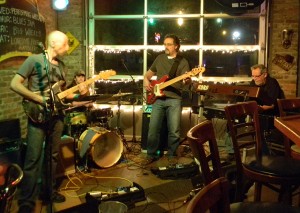 After Stevie’s tragic passing, Reese wound up in Nashville, TN, a place where he has continued to record and perform on a national level. During the talk, Reese passed around his All Music Discography, which reveals a staggering body of work, including Brooks and Dunn’s 2006 single of the year “Believe”. He offered us some thoughts about the differences between studio and live performance –
After Stevie’s tragic passing, Reese wound up in Nashville, TN, a place where he has continued to record and perform on a national level. During the talk, Reese passed around his All Music Discography, which reveals a staggering body of work, including Brooks and Dunn’s 2006 single of the year “Believe”. He offered us some thoughts about the differences between studio and live performance –
“I like being in the studio, I like playing gigs, I like playing clubs…all you people who do studio work know it’s two different things. Playing a club is really a chance to experiment…a chance to reach out in different directions and really find yourself. The studio isn’t really a place for that. The studio is where you don’t have to play it safe, but you’ve got to do something that’s exactly right for the 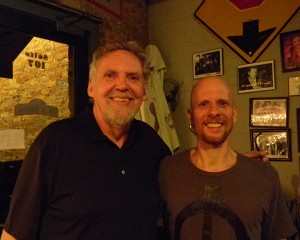 song…it’s a place for finding something that works, finding something unique that works.”
song…it’s a place for finding something that works, finding something unique that works.”
After his talk was finished, Reese was gracious enough to perform a set with our house band – a performance that was nothing short of inspired. I’ve heard his playing on many records, but there’s something intangible that you can feel in the heat of live performance that goes beyond a recording, and that was evident on this night. One of the songs we played together was “Little Wing”, a song that he had played on tour with Stevie, back in the day. On this song, Reese seemed to really stretch out in one of those magical musical moments in which time seems to stand still (see video below).
Eventually, this special night had to end, and we said goodbye after a quick photo op. Thanks, Reese, for sharing your wisdom, and for continuing to shine some light on that crown jewel of American music we call the blues.
Our second “Nashville Berklee Jam” at The Fillin’ Station in Kingston Springs this past Tuesday was a great success! The guest speaker on this night was none other than Nashville’s award-winning vocal coach, Judy Rodman. Judy has played many a role in the Nashville music industry 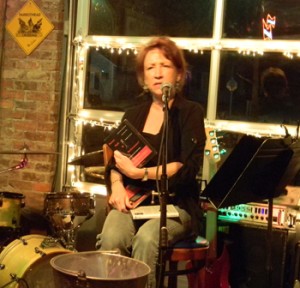 over the years – recording artist, A-list session singer, producer, hit songwriter – and on this night her talk focused on different career paths for vocalists. Judy was involved in the writing of my book “The Nashville Musician’s Survival Guide” and, backing up my theory of the necessity to “wear a lot of hats”, she talked about multiple streams of income for today’s musicians and artists. Among the potential jobs for vocalists she outlined were artists, live singers, and session singers (jingle singers, background vocals, demo singing, and voiceovers).
over the years – recording artist, A-list session singer, producer, hit songwriter – and on this night her talk focused on different career paths for vocalists. Judy was involved in the writing of my book “The Nashville Musician’s Survival Guide” and, backing up my theory of the necessity to “wear a lot of hats”, she talked about multiple streams of income for today’s musicians and artists. Among the potential jobs for vocalists she outlined were artists, live singers, and session singers (jingle singers, background vocals, demo singing, and voiceovers).
Here are a few excerpts:
“Recording artists need vocal ability, because the mark is up. Even with pitch fixing, rhythm fixing…your vocal needs to be as good as it possibly can be because it’s going to sound more natural and it’s going to be more emotionally compelling…You also need a ‘unique artist definition’…it’s not good enough to be just another great singer…you really need to be unique and find your own definition as an artist – your uniqueness, your vocal uniqueness – which means you need to explore your whole voice and your life experiences that you’re going to put into your art. The sound of your artistic definition is going to have to do with the sound of your voice, the choice of your instrumentation, and your message… Artistic definition takes exploration. For those of you wanting a career as a recording artist I would say don’t shortcut your experimentation.”
“For live background singing – you need to have the ability to trace and completely blend and go with the nuances of the voice of the singer you are looking to back…You’ve got to be able to change your sound as the artist wishes…you will of course have to have the ability to sing harmony parts and hear them… you have to have a specific look – whatever the artist is looking for. You need to network and find out who is gigging, who is in need of background vocalists.”
“Session singing…You need great vocal technique, usually you’ll need some vocal training…you really need to have surgical control of your voice for pitch, sound, blend and nuances –because time is money in the studio…You need to of course hear harmony parts quickly, you need to have the ability to read manuscript…but you also need to know the Nashville Number System.”
Judy then gave some practical vocal technique tips before answering several questions from alumni. Click on the following links if you would like to hear her talk in its entirety.
Judy Rodman Talk – Part One (21 min)Judy Rodman Talk – Part 1 (21 min)
Judy Rodman Talk – Part Two (21 min) Judy Rodman Talk – Part 2 (21 min)
There is also a ton of useful and practical information for vocalists at Judy’s website www.judyrodman.com.
When her talk concluded we began the jam portion of the evening with our house band backing Judy for two songs to start things out. Her second tune, “One Way Ticket”, was a number one hit she wrote that was cut by LeAnn Rimes. Judy’s vocal performance was emotionally 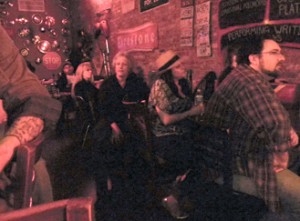 charged and inspiring to say the least, and this set the tone for the rest of the evening. A special dynamic on this night was the “optional vocal performance critique” that Judy offered for willing participants. To break the ice, I decided to go first and sang my two songs with the house band. After my first song, Judy pointed out some of the strengths about my performance and addressed a few things to work on.
charged and inspiring to say the least, and this set the tone for the rest of the evening. A special dynamic on this night was the “optional vocal performance critique” that Judy offered for willing participants. To break the ice, I decided to go first and sang my two songs with the house band. After my first song, Judy pointed out some of the strengths about my performance and addressed a few things to work on.
The jam continued with several great performances. Brian Lucas, the house keyboardist, sang a great rendition of “Georgia”, for which he took the vocal critique option. This pattern continued for the rest of the night, with literally every vocalist asking for a critique. Among these were Ted Schempp, the vocal duet “Acklen Park” (performing songs they co-wrote with alum, Shantell Ogden), Sarah Tollerson, and Michelle Lambert – all performing original 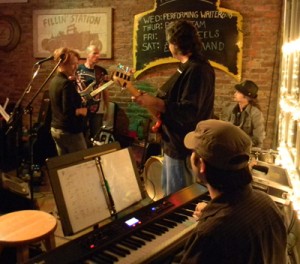 material. After the first song by each performer, Judy offered critiques and then we would try a part of the song again, seeing instant improvement in the vocals (don’t get me wrong, the vocal performances were pretty strong to begin with). Alums, Elton Charles on drums and Rick Carizales on guitar, also sat in and did a fine job backing up some of the guests. Brian Lucas made a big contribution by charting out many of the songs in advance, and Shantell helped out by taking photos and some great video excerpts (see below).
material. After the first song by each performer, Judy offered critiques and then we would try a part of the song again, seeing instant improvement in the vocals (don’t get me wrong, the vocal performances were pretty strong to begin with). Alums, Elton Charles on drums and Rick Carizales on guitar, also sat in and did a fine job backing up some of the guests. Brian Lucas made a big contribution by charting out many of the songs in advance, and Shantell helped out by taking photos and some great video excerpts (see below).
It really was a special evening, fun was had by all and I think everybody learned a few things too. I want to thank Judy Rodman, our house band (Heston Alley on drums, Tom Good on bass, Brian Lucas on keys) and all the alums who participated and helped make this a special evening, I can’t wait for the next one!
The next Nashville Berklee Jam will be held on Tuesday, April 10th at the Fillin’ Station with special guest, Reese Wynans, formerly of Stevie Ray Vaughn & Double Trouble. His talk will share perspective on being a lifelong career musician, working with SRV, and the importance of understanding blues and roots music. Please check our website regularly for updates.
Last night’s “First Tuesday of the Month Nashville Berklee Jam” was a huge success! The otherwise quiet Nashville suburb of Kingston Springs came alive as the alums began filtering into The Fillin’ Station for this night of camaraderie and music.
The mission of this monthly event is to help build our Berklee community in Nashville, and for the first hour, old friends reunited and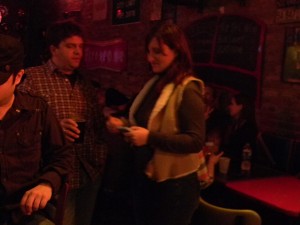 new friendships formed over lively conversation in this quaint setting. Shortly after 8 pm I made a few brief announcements before introducing the night’s guest speaker, A-list session bassist, Mike Chapman.
new friendships formed over lively conversation in this quaint setting. Shortly after 8 pm I made a few brief announcements before introducing the night’s guest speaker, A-list session bassist, Mike Chapman.
Mike’s talk centered on his lifelong career as a session player and he compared what he considers the key ingredients to being a successful studio musician to slices of a pizza.
The essential slices of the “session player pizza” include:
- Talent and Skill
- Positive Attitude
- Strong Work Ethic
- Flexibility
- Taste
In talking about the support role that musicians play on a recording, Mike commented “there’s a big difference between something that is fun to play, and something that is fun to listen to”, noting that they are not always the same thing. He also added that “musicians, both live and in the studio, are essentially in the service industry, and it’s our job to provide the window dressing to the song or artist”. Another point he couldn’t drive home hard enough was how essential it is to know “The Nashville Number System”, as this is the main way songs are charted in Nashville, again, both live and in the studio, and the book bearing the same title by Chas Williams is a great way to learn.
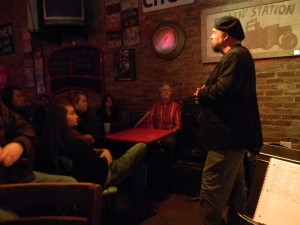 After Mike answered some questions from several alums it was time for some music. To get things started, I took the stage with our house band, consisting of Mike on bass and fellow alums, Heston Alley on Drums and Brian Lucas on Keys. We started out with a spirited version of Freddy King’s “Key to the Highway”, Paul Butterfield’s “Born in Chicago” (featuring bar owner, Patrick Weikenand on harp) and one of my favorites, “Ain’t Wasting Time No More”.
After Mike answered some questions from several alums it was time for some music. To get things started, I took the stage with our house band, consisting of Mike on bass and fellow alums, Heston Alley on Drums and Brian Lucas on Keys. We started out with a spirited version of Freddy King’s “Key to the Highway”, Paul Butterfield’s “Born in Chicago” (featuring bar owner, Patrick Weikenand on harp) and one of my favorites, “Ain’t Wasting Time No More”.
Our next grouping featured Ted Schemp on guitar and vocals and Elton Charles, a recent arrival to Nashville, on drums, and we played one of Ted’s originals followed by an instrumental blues jam. Sofia D got up and played some funky drums behind George Wong on bass and Ben Graves on guitar and vocals. Ben led us through a cool version of the Sam Cooke classic “Cupid” before Sarah Tollerson, host of another Alumni event, “Strength in Numbers” (held on the second Wednesday of each month at the Riverfront Tavern in downtown Nashville) joined us to sing “Oh Darlin’” and “You Make Me Feel like a Natural Woman”.
Michelle Lambert, another recent newcomer, brought charts for a couple of originals and delivered some emotive vocals interspersed with some fine fiddle playing to a couple of arrangements on the fly. Bassist, Keiffer Infantino got into the mix with another recent arrival, guitarist Rick Carrizales, and at this point Ben Graves came back up to play some sax. We played a funky jam in A minor and everybody got to stretch out before our final tune of “Freddy the Freeloader”, for which Mike Chapman got back up to finish the night.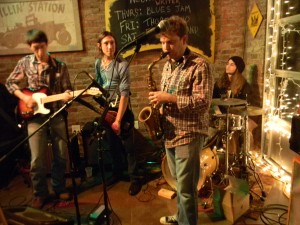
If there’s one thing I have learned from all of the alumni events I have attended, it would be that Berklee alums are some of the nicest people you’ll ever meet. And that open, warm feeling was evident in both the conversations and music that took place on this cold February night. I would also add enthusiasm to this list of traits, as there was an infectious, electricity in the air during these performances.
This jam was our first of many to come, as this will be held on the first Tuesday of each month, and the Nashville Berklee Jam website will serve to keep alums informed about future jams and all of the upcoming Nashville alumni events. I would also like to encourage interactivity on this site, so don’t be afraid to post, comments, songs you would like to play or any other ideas you may have. On that note, I’m looking for volunteers to take photos and possibly shoot a few video clips of our next jam for future blogs.
Thanks again to all those who participated in making this night a great success and see y’all at the next one!
For those who are new to Nashville, or considering relocating to Music City, my book “The Nashville Musician’s Survival Guide” is a street level perspective of the music related jobs found here, and the ultimate companion for today’s musicians, songwriters and artists. Decades worth of information learned on the streets of Nashville for $20! How can you go wrong?
Whether you are a longtime veteran of your local music scene, a recent music school graduate, a hired gun working for a national act, or an aspiring independent artist, you all have something in common – that being a life centered around music. This life of music will lead you into many different performance situations. Like many of my musician friends, I have found myself in a plethora of musical situations over the years; including top 40 bands, rock bands, blues bands, national acts, and start-up original projects, to name a few. I’ve played at festivals, mud bogs, weddings, frat parties, blues jams, jazz jams, open mics, on the Grand Ole Opry, and of course, in nightclubs and bars, the latter being be the arena in which I have probably performed the most.
If there’s one thing I have learned over the years, it’s that you can never have a big enough repertoire. Back in my Berklee days, one of my guitars instructors once told me “You should start building your repertoire of standards. Not only will it help you find your musical voice, it will come in handy down the road”. Twenty-something years and thousands of gigs later, I’ve really come to understand the scope and importance of his words.
Unless you play nothing but your own original music, most live music situations will involve playing a night of cover material, and in my mind, this is a noble cause. The audiences of your typical local bar are usually folks that want to hear some “feel-good music” – familiar, often danceable party tunes that will help them forget about life’s hardships. Before the world had ever heard of “The Beatles”, they were a working cover band, as was Aerosmith, Huey Lewis, and many others.
By the time I entered my nightclub performance years in the late 80s, there was already a few decades of recorded popular music to pick from. Some consider this time period (50s through the 70s) to be the golden era of recorded music. This era gave birth to many songs that are still big crowd-pleasers, those certain tunes that always have a positive impact, no matter what the demographic. While the following decades would add more songs to this pool, it seems that the golden era provides the bulk of what we consider “classic hits” and standards. Over the years, many people have put together lists of the most covered songs, the most popular songs, the greatest hits of all time, etc. In 2004, Rolling Stone Magazine released a list of “500 Greatest Songs of All Time”. Upon scrolling through this list I saw many songs that I had played in different bands and situations over the years.
After cross-referencing that list with the song lists of several modern day cover bands, and comparing that with my own personal experiences, I have come up with a list of what I consider to be songs that every working musician should know. This list is by no means definitive or official; it’s simply my take on the most commonly requested classics, songs that many cover bands have in common, and songs that are often played when guest musicians sit in. Many of these songs are thoroughly worn out and greatly overplayed. Some might argue that many of these tunes have been beaten to death, while others might call this list “Dead Songs That Kill Bands”. Nevertheless, if you are planning on a lifetime of musical performance, knowing these songs, at the absolute least, will come in handy at some point.
| Aint no Sunshine | Bill Withers |
| Ain’t Too Proud to Beg | The Temptations |
| All along the Watchtower | Jimi Hendrix |
| All Right Now | Free |
| Blue Moon Of Kentucky | Patsy Cline |
| Born to Be Wild | Steppenwolf |
| Breakdowm | Tom Petty |
| Brick House | The Commodores |
| Broken Wing | Martina McBride |
| Brown Eyed Girl | Van Morrison |
| Can’t Get Enough | Bad Company |
| Crazy | Patsy Cline |
| Crossroads | Cream |
| Drift Away | Dobi Gray |
| Feelin Allright | Joe Cocker |
| Folsom Prison Blues | Johnny Cash |
| Free Bird | Lynyrd Skynyrd |
| Friends in Low Places | Garth Brooks |
| Georgia | Ray Charles |
| Gimme Three Steps | Lynyrd Skynyrd |
| Good Hearted Woman | Waylon Jennings |
| Hard to Handle | Black Crows |
| He Stopped Loving Her Today | George Jones |
| Hit Me With Your Best Shot | Pat Benatar |
| Honky Tonk Woman | Rolling Stones |
| I Feel Good | James Brown |
| Johnny B Good | Chuck Berry |
| Knock on Wood | Eddie Floyd |
| Knockin on Heavens Door | Bob Dylan |
| Last Chance For Mary Jane | Tom Petty |
| Little Sister | Elvis Presley |
| Long Train Runnin’ | Doobie Brothers |
| Mama Don’t Let Your Babies | Waylon Jennings |
| Margaritaville | Jimmy Buffet |
| Me and Bobby McGee | Janis Joplin |
| Mony Mony | Tommy James & the Shondells |
| Mustang Sally | Wilson Pickett |
| Old Time Rock and Roll | Bob Seger |
| Piece of My Heart | Janis Joplin |
| Pink Houses | John Mellencamp |
| Play That Funky Music | Wild Cherry |
| Pride and Joy | Stevie Ray Vaughn |
| Red House | Jimi Hendrix |
| Redneck Girl | Gretchen Wilson |
| Respect | Aretha Franklin |
| Roadhouse Blues | The Doors |
| Rock ‘n Roll | Led Zeppelin |
| Satisfaction | Rolling Stones |
| Save a Horse Ride a Cowboy | Big and Rich |
| Sittin’ on the Dock of the Bay | Otis Redding |
| Some Kind of Wonderful | Grand Funk Railroad |
| Soulman | Sam and Dave |
| Stand by Your Man | Tammy Wynette |
| Standin On Shaky Ground | Delbert Mcclinton |
| Statesboro Blues | Allman Brothers |
| Stormy Monday | Allman Brothers |
| Summertime | Billy Holiday |
| Superstition | Stevie Wonder |
| Sweet Home Alabama | Lynyrd Skynyrd |
| The Chair | George Strait |
| The Joker | Steve Miller |
| The Thrill Is Gone | BB King |
| Tush | ZZ Top |
| Twist and Shout | The Beatles |
| Walkin’ After Midnight | Patsy Cline |
| What I Like About You | The Romantics |
| Wonderful Tonight | Eric Clapton |
| Workin’ Man Blues | Merle Haggard |
| You Really Got Me | The Kinks |
| You Shook Me All Night Long | ACDC |
Here are a few of what I consider to be the benefits of having a big repertoire of standards:
Requests. If you ever wind up playing some cover gigs, which many musicians do at some point, “standards” will often get requested, and you might find your band “winging” these songs to please audience members. This even happens with national acts.
Sitting in. Having a big repertoire of standards will give you some common ground when sitting in with a band. Back in my New England nightclub days, when friends would sit in with my bands, we would play standards. The same was true when I would sit in with their bands. In Nashville today, sitting in is one of the best ways to build your reputation as a player. Even when superstars sit in, it seems they often choose classic hits or standards over their own material.
Big Tips. If you already play in a cover band, knowing the most popular classics can help you earn some extra tips. I can’t think of how many times someone has said “I’ll give you guys $20 if you play Sweet Home Alabama again.” (Make it an even $50, and it’s a done deal!)
Song Structure. These songs were hits for a reason, and it’s not a coincidence that people still like to hear these songs decades after they were released. Whether it is your desire to be a great performer or a songwriter, internalizing some of these classic hits will teach you song form and structure, and give you perspective about what strikes a chord with the masses.
I would love to hear your thoughts on this list. Are there some songs you feel I missed? Are there songs on here that you think don’t belong? Wherever your musical path might lead, always do your best to smile when playing Mustang Sally, and never accept less than a $20 to play Free Bird!
